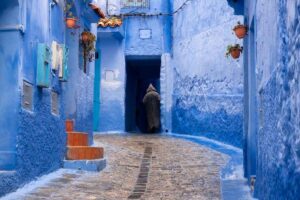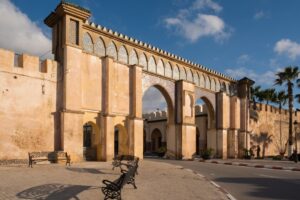Morocco, a colorful country with vibrant cities and stunning landscapes. Having your own car and driving in Morocco has a lot of advantages. If you already read other posts on our blog, you may have noticed we love road trips. If offers us the ultimate freedom to explore and allows us to make most of our limited time in a country. At first we were reluctant regarding hitting the roads in Morocco. However, after traveling two weeks in Morocco, we highly recommend it and we noticed that there are a lot of prejudices if it comes to Moroccan traffic.
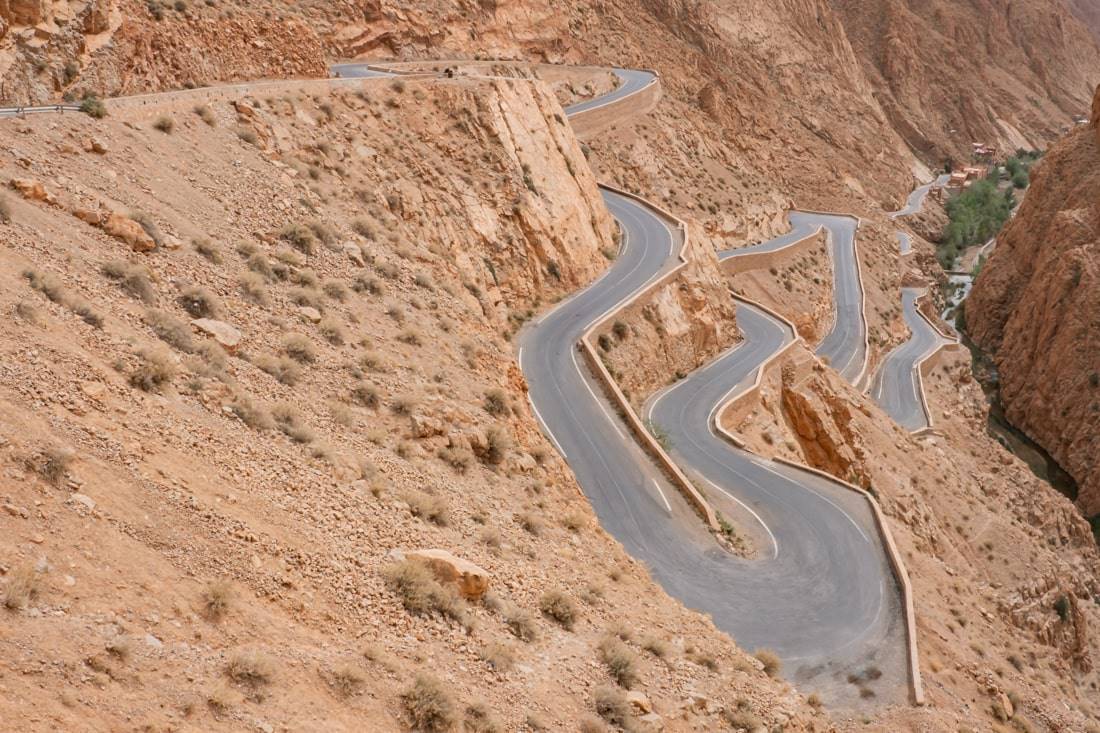
Some of the links on this blog are affiliate links. This means if you click on a link and purchase, we receive a small commission at no additional cost to you. The affiliate links concern only products and services we appreciated highly and trust. This means the views and opinions expressed in this post are purely our own. For more information, read our privacy and cookie policy.
In this blog post, we’ll discuss everything you need to know about renting a car and driving in Morocco. From choosing the right vehicle, insider tips for safe driving in Morocco, mastering mountain passes, and avoiding the alleys of the narrow streets of the medinas. So buckle up and read on how to prepare your journey through wonderful Morocco, where every turn of the road reveals a new adventure!
Table of Contents
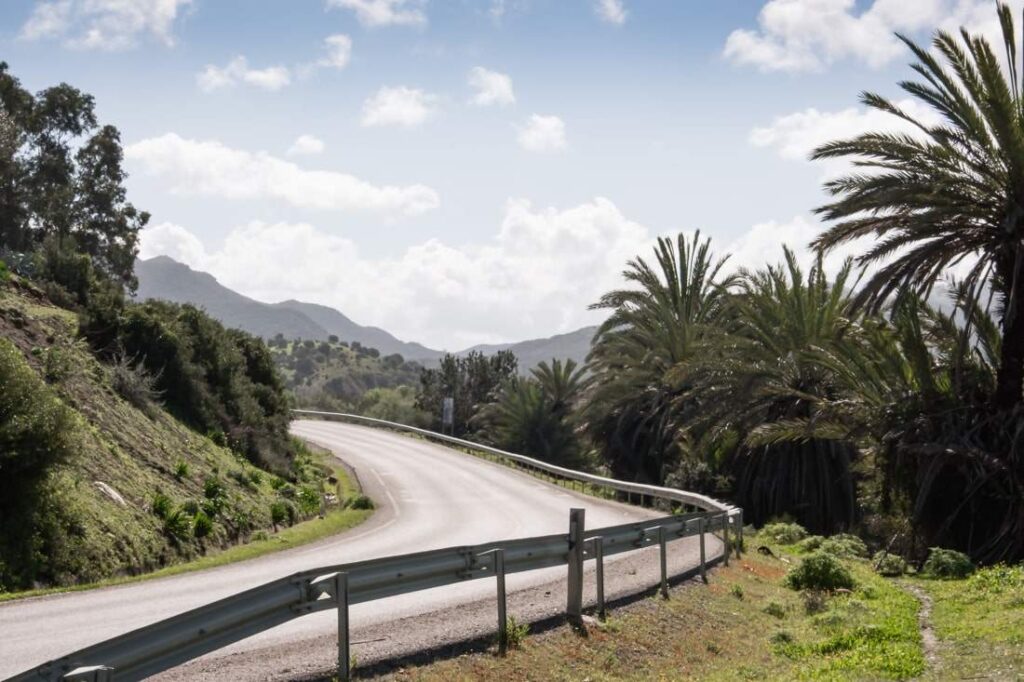
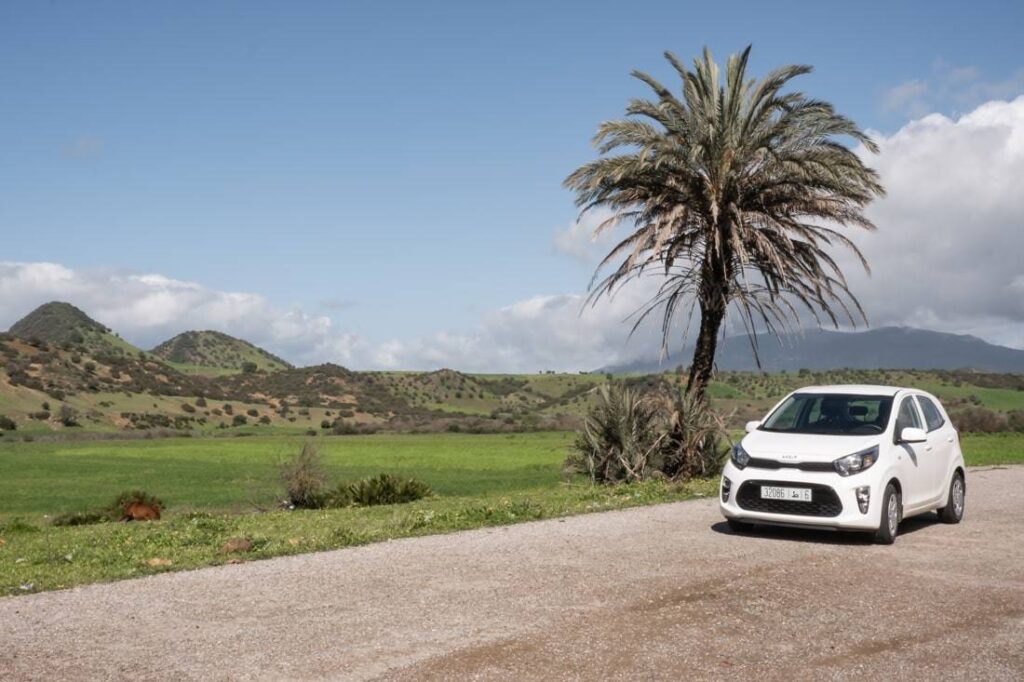
Prejudices about driving in Morocco
Before going into more detail about renting a car and hitting the road in this North African nation, let’s discuss some prejudices about driving in Morocco. In different posts online, we read that many travelers approach Moroccan roads with a mixture of excitement and anxiousness, based on stories of narrow streets, chaotic scooter traffic and a laissez-faire attitude towards traffic rules.
And yes, the traffic in Morocco can be chaotic. But this is mainly restricted to the traffic in the cities where it seems like no traffic rules exist. However, outside these cities, the roads are less busy and traffic is agreeable. As most of the cities in Morocco can be discovered on foot, we recommend to park your car just outside the medina and explore the city by walking. That way, you restrict your time in city traffic and you avoid the narrow streets of the medina.
Another thing we read online were stories about corrupt police officers that invent anything to fine you. During our 14 days driving in Morocco, we encountered many police checkpoints but never were we pulled over. Overall they all seemed very friendly. We did however always respect the speed limits and slowed down at these checkpoints.
Another myth about driving in Morocco are the unpredictable driving conditions, including roads in bad condition, dangerous mountain roads and difficult navigation. In contrary to a couple of years ago, the quality of the roads in Morocco has increased substantially. And all names of destinations are signposted both in Arabic and French.
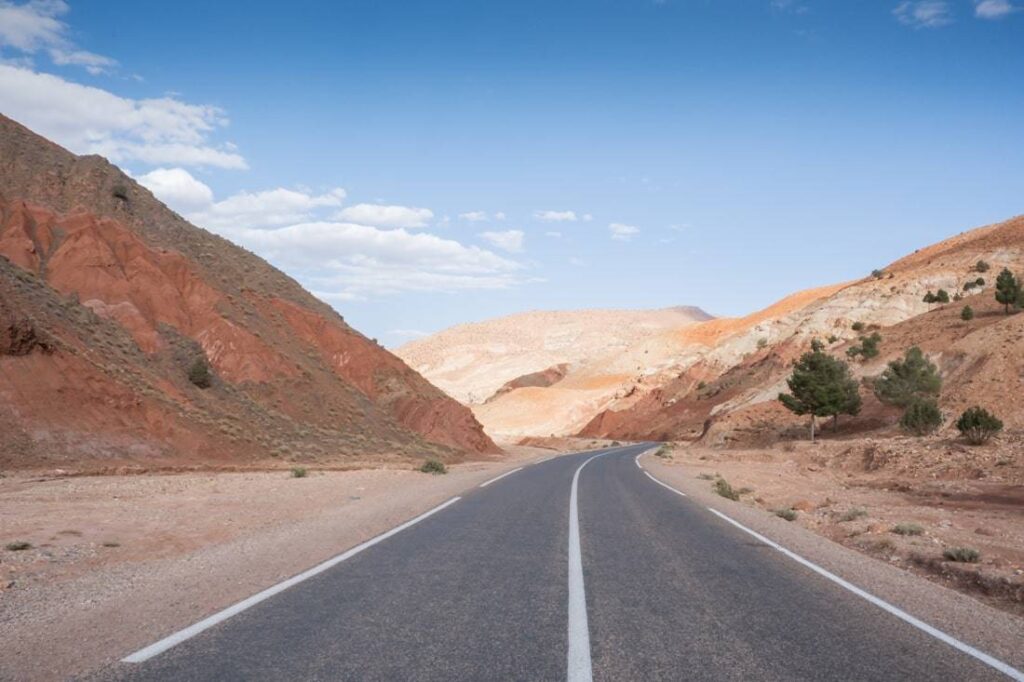
The advantages of having your own car in Morocco
Although there seems to be a lot of prejudices about driving in Morrocco, we only discovered the advantages. As always, one main advantage of having a rental car while travelling is the freedom to explore. You can explore destinations that are less accessible by public transport and you can freely decide on how much time to spend at a certain place.
Furthermore, at certain moments in Morocco, your car will function as a place to relax and to escape the hustle and bustle of the Moroccan street scene. Another advantage is that you can explore more independently. We loved it that we could park our our car at the edge of the Sahara desert and explore the sand dunes on foot, without a tour. And what views did we see after we parked our car at the Todhra gorge and did a stunning circular hike. If you rely on public transport, these explorations are definitely more difficult to arrange.
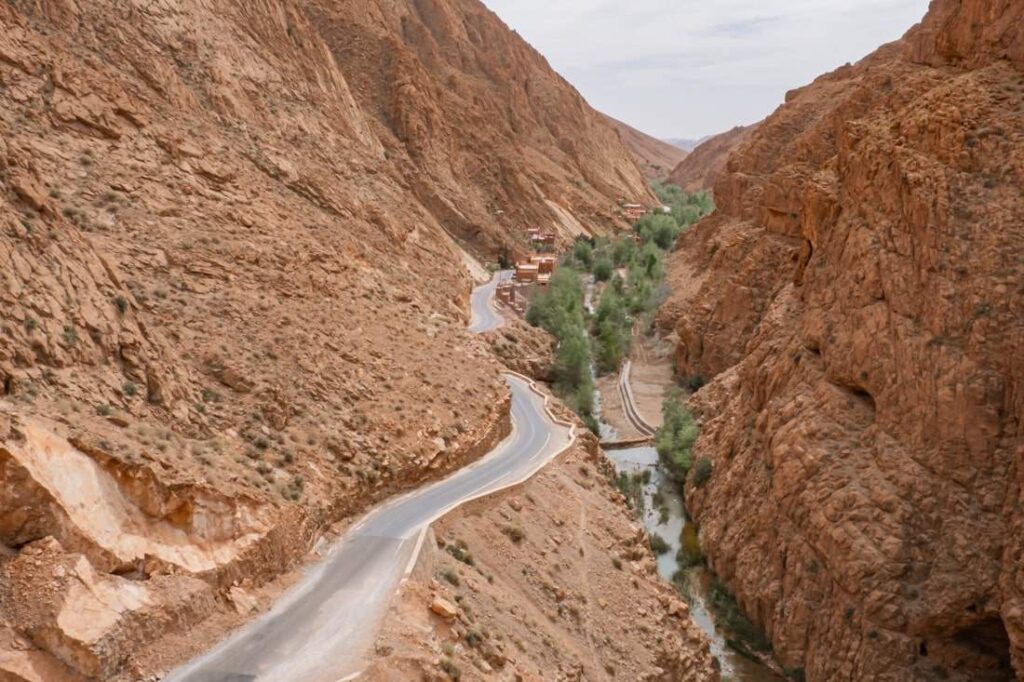
A fourth advantage of having your own car in Morrocco are the scenic drives. We loved exploring the Ounila and the Roses valley by car and we massively enjoyed our drive from Chefchaouen to Meknes. We were able to stop whenever we wanted to and took plenty of photographs along the way.
In summary, having your own car and driving in Morocco offers flexibility, convenience, and the opportunity to discover the stunning landscapes. If you want to travel free and independently, a road trip in Morocco is in our opinion the way to go!
Renting a car in Morocco
When arriving in Morocco, the first thing you’ll need to start your road trip is a rental car. At all the main airports of Morocco, there are plenty of rental car companies to choose from. We also recommend to always read the reviews of the rental car company you are considering. By doing so, you may be aware of the typical scams they use. That, and with our tips below, you’ll be able to better negotiate when you pick up your rental car.
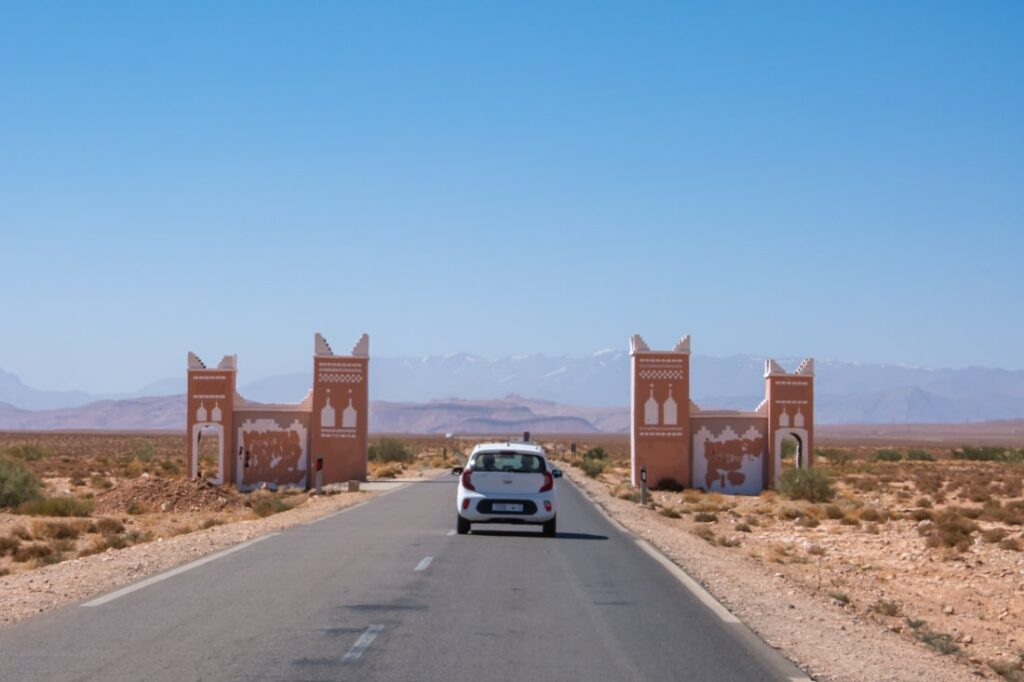
Always inspect your car thoroughly!
We already had plenty of rental cars during our travels, but never did we receive a car with so many scrapes as our car in Morocco. Make sure that when you pick up your car, you take good photos of the car to indicate where the damage is. We also strongly recommend making a video showing exactly where you see any scrapes or damage. This footage can come in handy when there is any discussion upon returning the car.
Also ask to clearly indicate any damage on the rental papers that come with your rental car. Make sure to check the amount of fuel in the car and make sure you bring the car back with the same level of fuel. Our car was almost totally empty, so we had to stop at the nearest petrol station near the airport to fill up our tank.
These are all just precautions, we didn’t had any problems or discussions when we returned our rental car and were always treated correctly. Note that, as always, we took full insurance so we could explore Morocco worry free!
Choosing a rental car company
We always book our rental cars through discovercars.com. Discovercars.com is a world leader in comparing prices and offers great deals, free cancellation and included insurances. We experienced during our previous travels that they have excellent customer service and their all-inclusive insurance can’t be beaten.
Check availability and compare prices
What type of car to rent in Morocco
When we traveled through Morocco, we rented a small 2WD car (Kia Picanto). All the main roads in Morocco are asphalted and well maintained, so we didn’t feel any need to rent a 4WD. If you have a lot of luggage, we do however recommend to book a larger car. That way, you are able to put all your luggage in the trunk of your car and you don’t tempt anyone to break in.
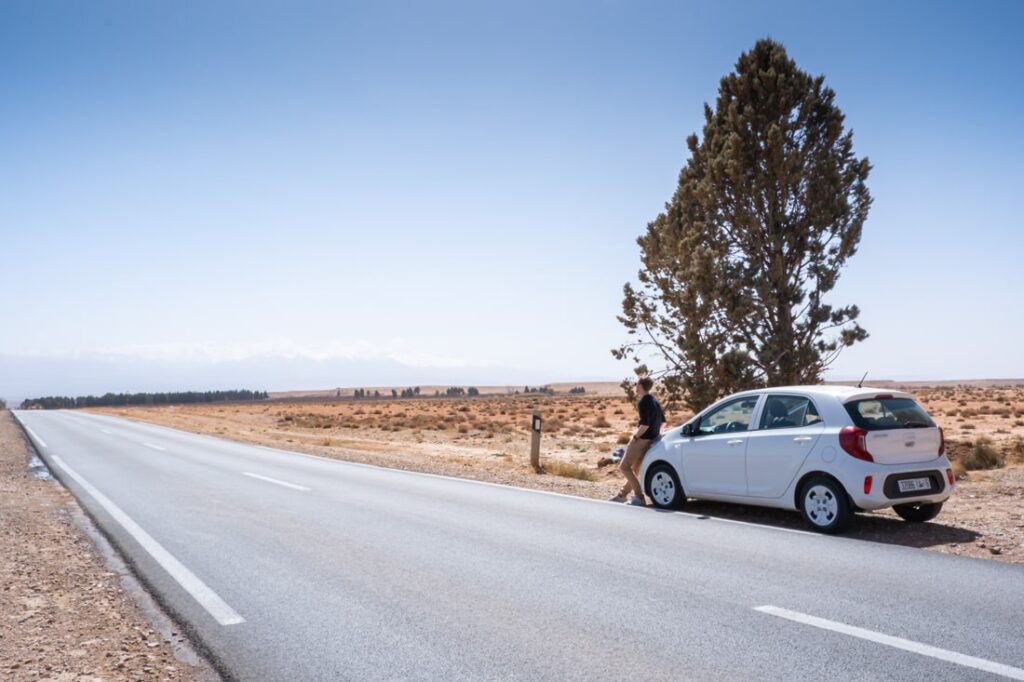
Petrol and gasoline in Morocco
Petrol and gasoline prices in Morocco are very affordable. We paid around 1.4 EUR (1.5 USD) per liter petrol. Although we drove more than 2.000 kilometers, our little car was very efficient and we only had to fill up our tank three times.
In Morocco, you don’t have to worry about finding a petrol station, as these are widely spread all over the country. At the gas stations, there are employees that will fill up your tank for you. At most gas stations, you can pay by card. However, in more remote areas and smaller villages, only cash payment is available. Plenty of gas stations also have a small shop and are the place to go to if you need to wash your car. A car wash for the exterior will cost around 30 dirham (2,8 EUR/ 3 USD).
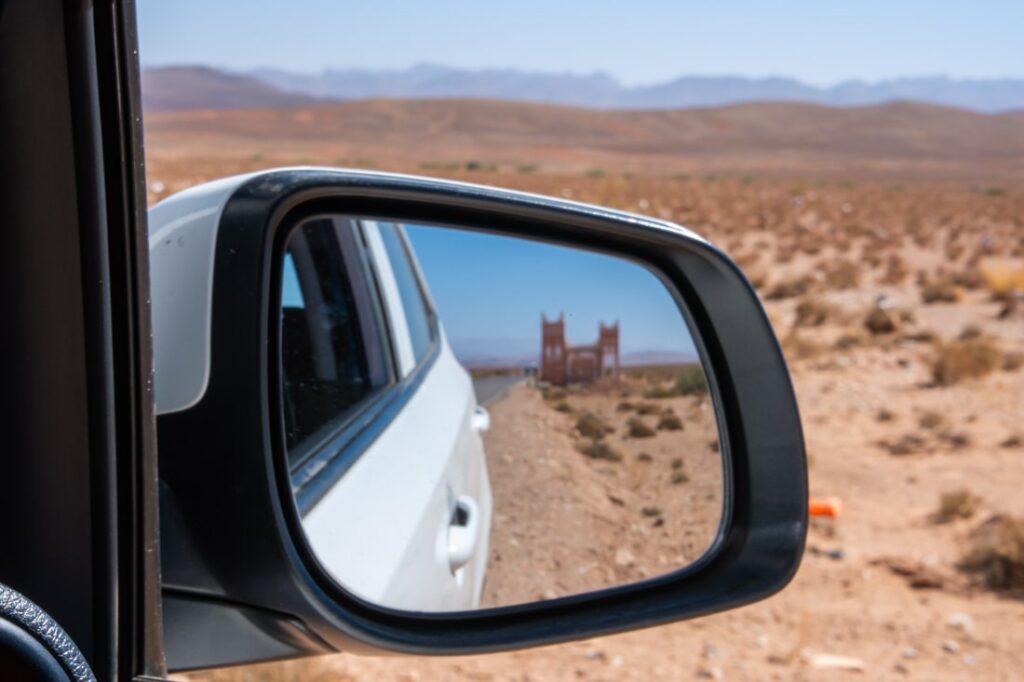
Parking in Morocco
Outside the main cities, it is not difficult at all to find a good parking spot. But the opposite is true for the busy city centers. Overall, we recommend to park your car outside the city center (the medina). Otherwise, you will have to navigate through narrow alleyways, with the risk of getting lost in the maze of the medina streets. To find a parking spot outside the city center, you have different options. The first option is to ask your hotel upfront where to park best. Normally, most hotels will give you some options and will mention the parking cost.
Another option is to look for parking on Googlemaps or on the app Park4Night. You will be able to read the reviews, including the parking cost. This will allow you to find the perfect parking spot before arriving in the city. Make sure to discuss the parking cost upfront with the local parking manager. We paid around 20-30 dirhams (1,85 EUR/ 2 USD to 2,8 EUR/ 3 USD) per day.
Driving distances in Morocco
If you know that the size of Morocco is roughly comparable to the size of France, you can imagine that the driving distances can be considerable. Below you can find the driving distances between the main cities in Morocco with a travel itinerary from North to South in mind.
- Tangier to Chefchaouen – The driving distance between Tangier and Chefchaouen is approximately 120 kilometers (75 miles) and the drive will take about 2 to 3 hours. Main advantage is that the road takes you through mountainous terrain, that includes stunning views.
- Tangier to Rabat – The distance between Tangier and the capital of Morocco (Rabat) is approximately 270 kilometers (168 miles). This drive will take around 3 to 4 hours.
- Rabat to Casablanca – From Rabat to Casablanca you’ll drive approximately 95 kilometers (59 miles), doable in 1 to 1,5 hours.
- Chefchaouen to Fès – The distance between Chefchaouen and Fès is approximately 200 kilometers (124 miles) and it will take around 3 to 4 hours to complete. This route offers stunning views of the Rif Mountains.
- Fès to Meknès – The distance between Fès and Meknès is around 60 kilometers (37 miles) and it will take around 1 to 1,5 hours.
- Fès to Merzouga – This is probably one of the largest driving distances. The distance between Fès and Merzouga is approximately 470 kilometers (292 miles). Because of the mountain roads and the speed limits, this drive usually takes around 7 to 8 hours.
- Merzouga to Boumalne Dadès – Driving between Merzouga and Boumalne Dadès will take about 5-6 hours and the driving distance is approximately 350 kilometers (217 miles). Along the way, make sure ta have a stop at the Todhra gorge.
- Boumalne Dadès to Aït Ben Haddou – From Boumalne Dadès to Aït Ben Haddou, the driving distance is about 170 kilometers (106 miles) and will take around 3 to 4 hours.
- Aït Ben Haddou to Marrakech – You’ll drive approximately 3 to 4 hours from Aït Ben Haddou to Marrakech. Driving distance is about 190 kilometers (118 miles). Make sure to take the road through the Ounila valley and continue via the Tizi n’Tichka Pass. We promise you won’t regret it!
- Marrakech to Essaouira – From Marrakech to Essaouira, the driving distance is approximately 175 kilometers (109 miles) and the drive will take 2,5 to 3 hours.
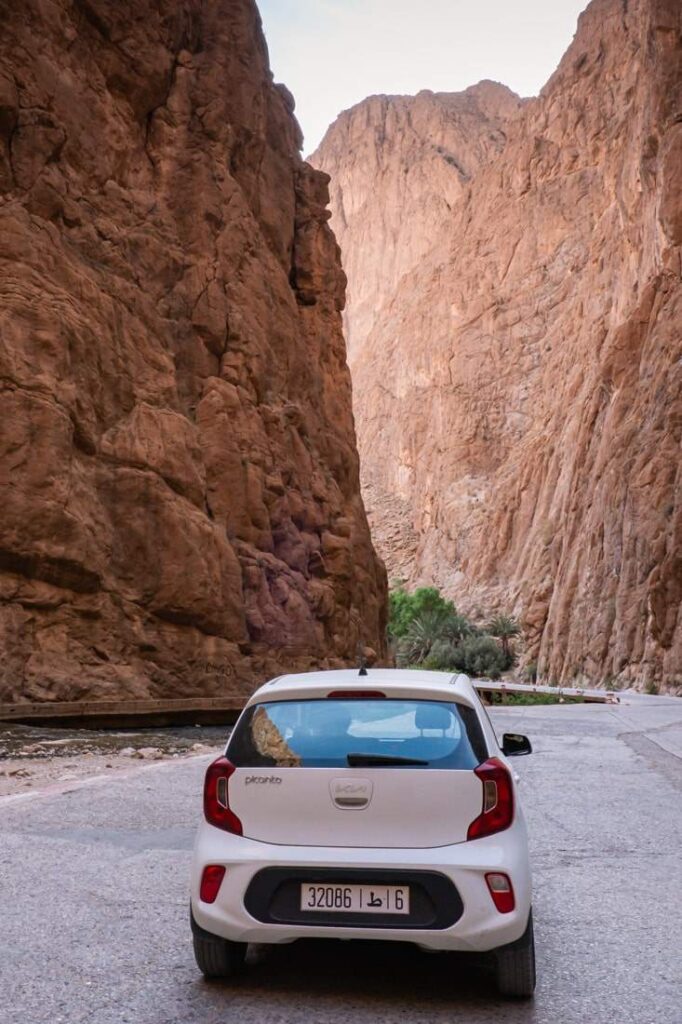
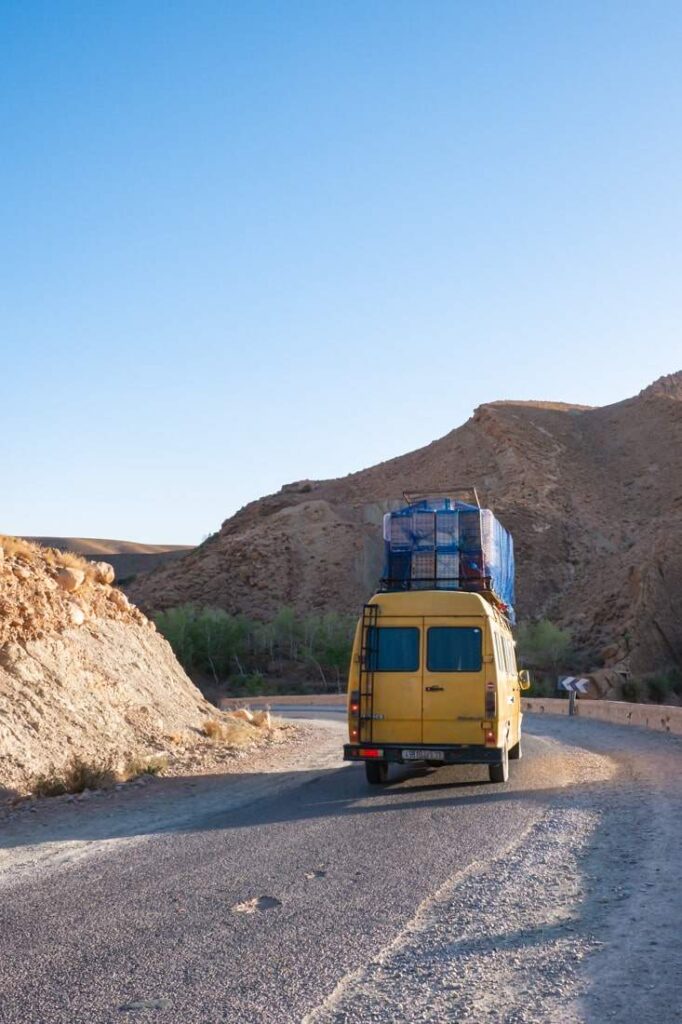
The most important driving rules in Morocco
Ever heard the joke that says the only traffic rule in Morocco is that there are no traffic rules? Well, it’s not entirely true, but let’s just say they are rather flexible with the rules. But don’t worry, here, we give you some of the most important traffic rules to keep in mind when driving in Morocco.
- The right side is the right side. We’re not promising you won’t spot a donkey cart or bicycle driving on the left, but in Morocco, you drive on the right side of the road.
- Seatbelts are obligatory. This is true for both drivers and passengers.
- Always adjust your speed to the speed limits. We know, the speed limits in Morocco can be a little bit ridiculous. It is not uncommon to see four different speed signs within just 200 meters. You might find yourself transitioning from 80 km/h to 60 km/h, then swiftly down to 40 km/h and 20 km/h. But checkpoints with speed guns are common as well, so make sure to keep to the speed limits if you don’t want to be fined.
- Be cautious at roundabouts. There are many roundabouts in Morocco. Especially these in urban areas need your attention. Nobody stays in their lane nor to they yield adequately. Ideally the outer ring must exit at the first opportunity.
- Watch out for pedestrians and livestock. Along Moroccan roads, you’ll see many pedestrians and all types of animals: goats, sheep or a camel or two. Especially when it’s dark, they are very difficult to see. So when overtaking, always make sure the road in front of you is clear.
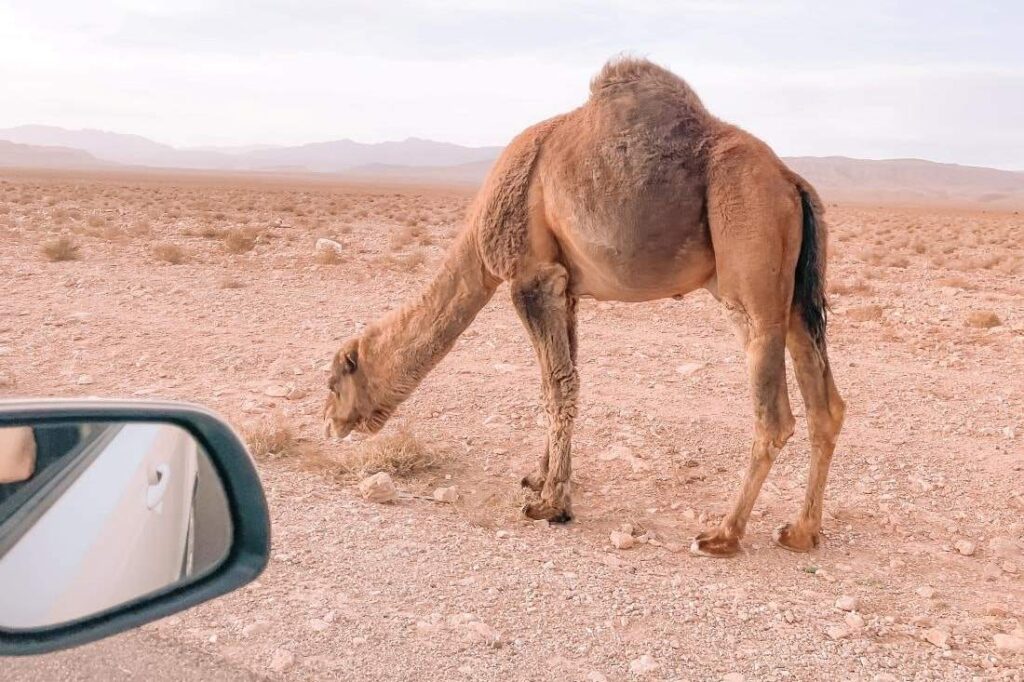
Other tips for driving in Morocco
Below, you can find some more tips and advice regarding driving in Morocco.
- If oncoming traffic is flashing their lights at you, it means that there is a police checkpoint. Make sure you stick to the speed limit.
- Honking is a way of communication. In Belgium, honking your car is considered as rude and aggressive. In Morocco, honking is normal and can mean a lot of things. Sometimes it is a warning to say they are overtaking, sometimes it’s saying they are impatient, sometimes it is just saying ‘hi’ to you. So don’t be intimidated. Who knows, at the end of the trip you might be honking as well.
- Another tip is taking your time. Driving times can be slower than you might think upfront. We got stuck plenty of times behind a slow-moving vehicle, with no possibility to overtake. And speed limits are often restricted to 80 km/h. So don’t try to cram too much into each day.
- Don’t drive at night. We already mentioned that there are a lot of animals and people on the street. And sometimes streets are not lit. So when it is dark, it is very difficult to see them and an accident can happen very fast.
- Clean your car before you bring it back. Your car will get dirty when road tripping in Morocco. Our car was blessed with seagull poop in Essaouira combined with dust from the roads. So before we brought our car back, we used a car wash at a petrol station. Returning a clean car avoids cleaning fees and always give a good impression to the rental car company.
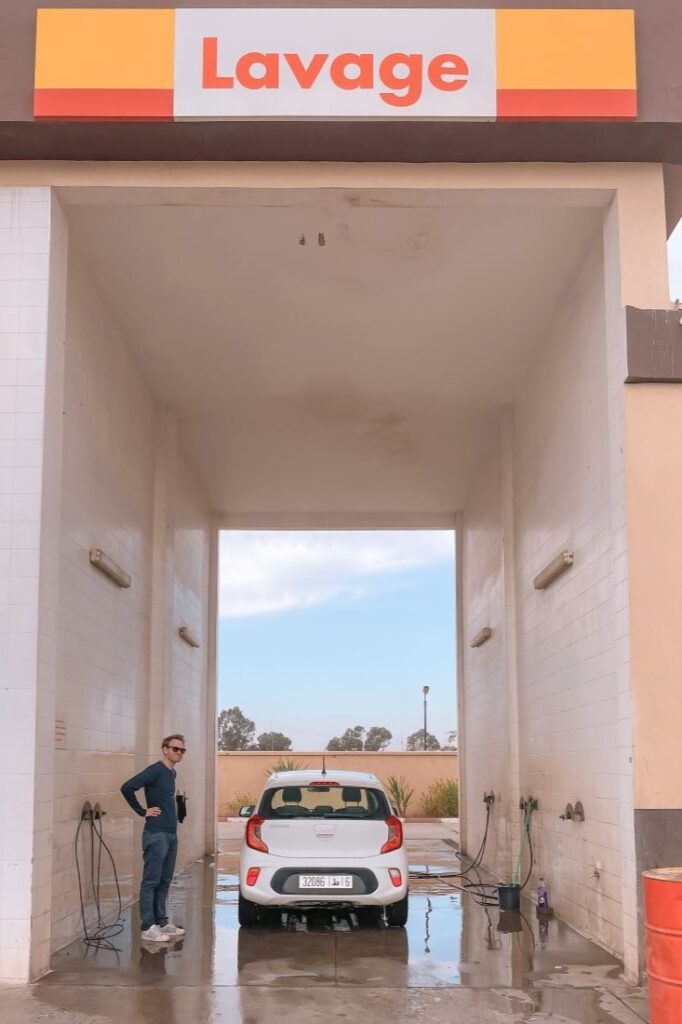
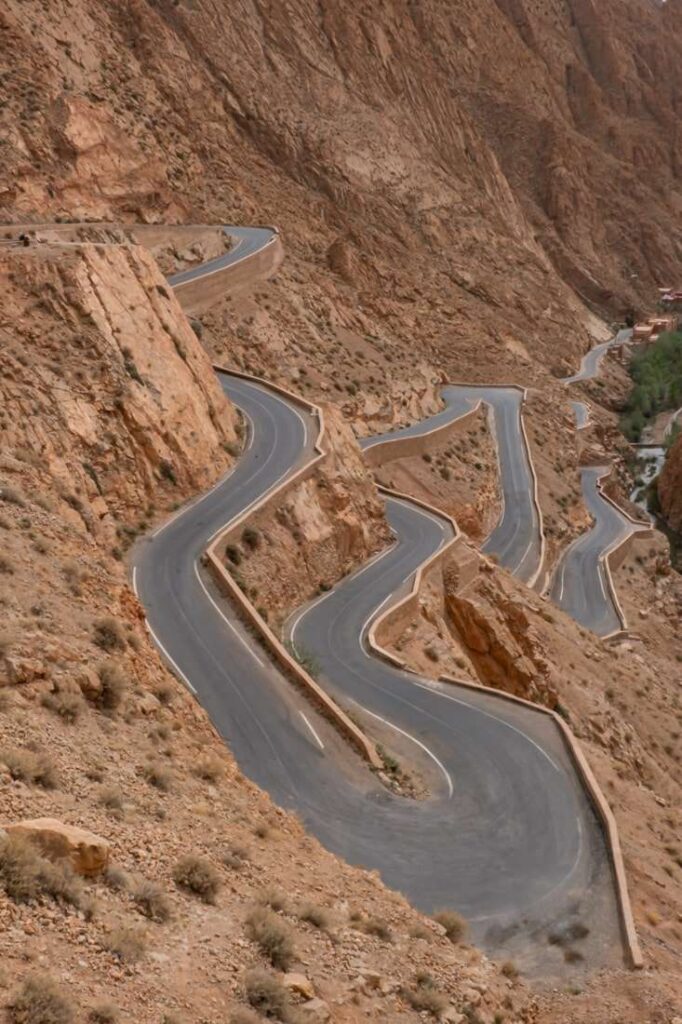
What to bring with you when you rent a car in Morocco?
When renting a car in Morocco, make sure to bring your (international) driving license with you. Next to that, you will need to bring a valid credit card for the deposit.
As the use of a smartphone is prohibited whilst driving, it can be a good idea to bring a holder for a smartphone, especially if you want to use your smartphone for navigation. Our car didn’t had any navigation system, so we relied on Google maps and maps.me (offline navigation).
Morocco has three big SIM card providers – Maroc Telecom, Orange Morocco, and Inwi. We bought a SIM card from Inwi and we’re satisfied with the coverage. All three providers have plenty of stores and kiosks (at the airports, ferry ports, and in every town and city across the country). We highly recommend to buy your SIM card from an official store. Street vendors charge you more for the same amount of mobile data. When we arrived in Tanger, we did not find an official store wo had to go with the SIM cards from the many vendors. Afterwards, we found out we paid double the price for 10GB of data.
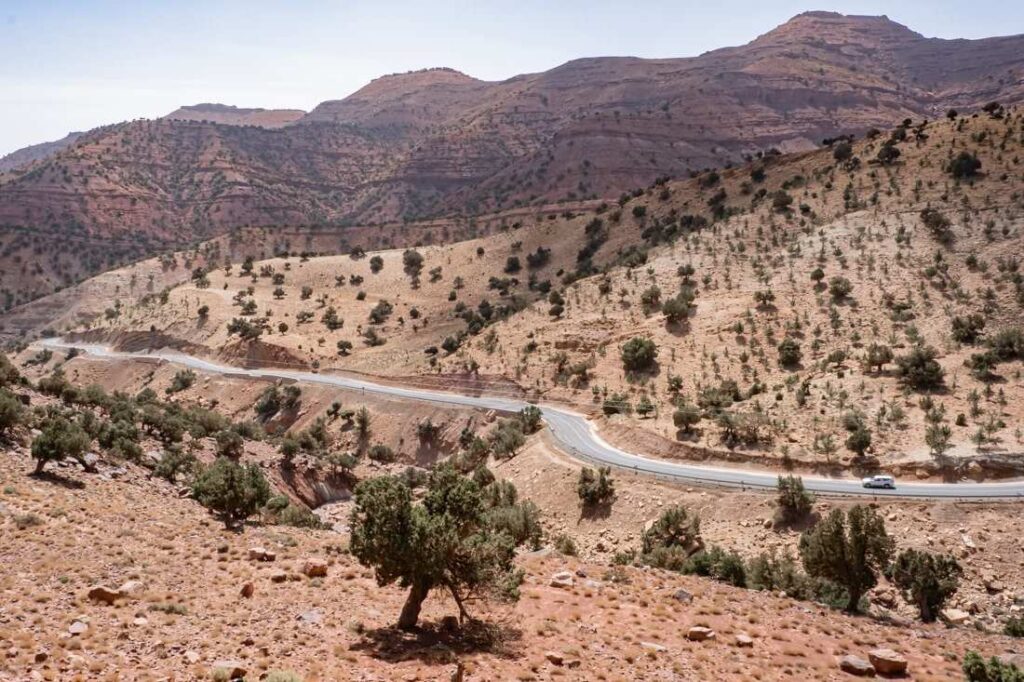
Another useful thing to bring with you when embarking on a road trip in Morocco is a phone charger or a powerbank. We brought both. Apparently, the 12V outlet in our car wasn’t working very well, so we had to charge our phones with our powerbank whilst driving.
Well that’s it, our tips and advice for renting a car and driving in Morocco! We hope this blog post will convince you that having your own car is the best way to explore this beautiful country. We hope you found all the info you needed for renting a car and driving in Morocco.
Happy exploring!
Matthias and Mieke
Quick start your holiday with the help of our trusted tools
These are the websites we highly recommend to plan your next trip. We use them all the time to save money and travel freely! Did you know that by purchasing through our links, you support us at no additional cost. Thank you for your support. ♥️
Find hotels: via booking.com
Find a rental car: via discovercars.com
Find cheap flights: via skyscanner.com
Book tours & attractions: via getyourguide.com
Book a bus / train / transfer: via omio.com—
